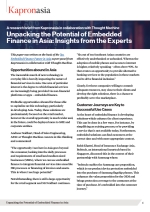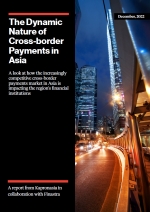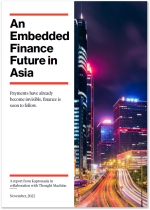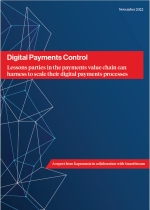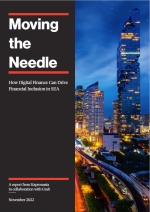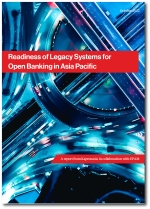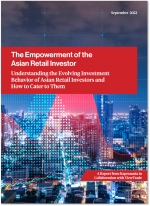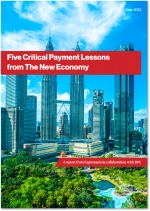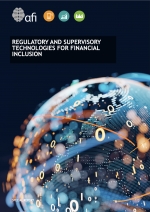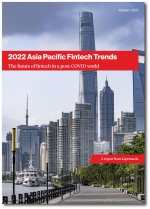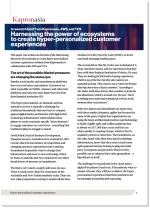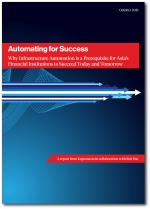Financial Industry Research Reports
Readiness of Legacy Systems for Open Banking in Asia Pacific: A research brief from Kapronasia in collaboration with EPAM
Published: Jan 2023Open Banking arose out of a sweeping piece of European Union (EU) legislation known as the second Payment Services Directive, or PSD2, in 2016. It is the use of application programming interfaces (APIs) to streamline the sharing of customer bank data with third parties.
Unpacking the Potential of Embedded Finance in Asia - A Research Brief from Kapronasia in Collaboration with Thought Machine
Published: Jan 2023The inexorable march of new technology in everyday life is heavily impacting the nature of financial services in Asia. One area of particular interest is the degree to which financial services are increasingly being provided via non-financial platforms or apps – embedded finance.
The Future of FinTech in Growth Markets - A Report from Kapronasia in Collaboration with Elevandi
Published: Dec 2022The seventh edition of the Singapore FinTech Festival (SFF), which concluded on the 4th of November 2022, attracted more than 62,000 participants from over 115 countries. This was the largest SFF gathering since the inaugural edition in 2016. As we look back at the Festival, it is valuable to consider the role that the Festival has played in the context of FinTech in Singapore and globally.
The Dynamic Nature of Cross-border Payments in Asia - A Report from Kapronasia in Collaboration with Finastra
Published: Dec 2022Global cross-border payment volume is booming, driven by increased economic connectivity and rapid technological advances. The sheer number of rails has led to intense market competition that is gradually redefining the cross-border payments landscape. Financial institutions and fintechs sometime cooperate with each other or bank on one currency corridor and compete on another.
An Embedded Finance Future in Asia - A Report from Kapronasia in Collaboration with Thought Machine
Published: Nov 2022Financial services have evolved over time as banks and other financial institutions have improved the customer experience using digital solutions to make services faster and more convenient. The benefit of these developments has been profound, to the point where banking and financial services have been dramatically simplified and the cost of making transactions has been reduced substantially.
Digital Payments Control - A report from Kapronasia in collaboration with SmartStream
Published: Nov 2022There has been an exponential increase in contactless and online payments, driven by new technology which is leading to growing risks around the handling of the sheer number of disputes and reconciliation with credit card schemes.
Moving the Needle: How Digital Finance Can Drive Financial Inclusion in SEA - A Report from Kapronasia in Collaboration with Grab
Published: Nov 2022Southeast Asia is one of the most rapidly developing regions in the world and is set to become the world’s fourth-largest economy by 2030. However, more than 70% of the adult population across the region have limited access to financial services. Millions of SMEs face large funding gaps. The challenges preventing further take-up of financial services need to be overcome.
Readiness of Legacy Systems for Open Banking in Asia Pacific - A Report from Kapronasia in Collaboration with EPAM
Published: Oct 2022Open banking is the use of application programming interfaces (APIs) to streamline the sharing of customer bank data with third parties. While that is the premise of all open banking, there are different “flavors” of it that can be observed across the Asia-Pacific (APAC). At a high-level, these can be roughly parceled into those that are market-led and those that are regulator-led.
The Empowerment of the Asian Retail Investor - A Report from Kapronasia in Collaboration with ViewTrade
Published: Sep 2022As economic dynamism has shifted East to give rise to what has been termed the “Asian Century,” hundreds of millions of people across Asia have achieved middle income status. As affluence across the region grows, people are looking for ways to further build and diversify their wealth.
Digital Asset Tokenisation in Asia Pacific - A Report from Kapronasia in Collaboration with Chintai
Published: Sep 2022There is a raft of Digital Asset Tokenisation activity across Asia as many entities are developing and launching new tokenisation platforms. These players range from traditional institutions such as banks and exchanges to ambitious startup Fintechs looking to disrupt the existing modus operandi.
Five Critical Payment Lessons from The New Economy - A report from Kapronasia in collaboration with BPC
Published: Jun 2022Digital transformation in the financial services industry is proceeding at a rapid pace, driven by intense competition from new players entering the market, the evolution of customer expectations, regulatory pressures, and Covid-19. How are payment players meant to respond to such an unforgiving terrain?
Regulatory and Supervisory Technologies for Financial Inclusion - a report from AFI written by Kapronasia
Published: Feb 2022Global financial regulators are turning to RegTech and SupTech to handle new challenges around the regulation of innovative fintechs and digital financial services.
2022 Asia Pacific Fintech Trends
Published: Jan 20222021 was marked by a dramatic shift as finance went digital and financial institutions, fintechs, and ecosystem players all competed for a increasingly fickle set of customers. Hyperpersonalization was key as customers demand a new anytime and anywhere engagement with their financial providers. 2022 shows no signs of slowing down as digital currencies, platforms, and new competitors look set to re-define finance once again.
Harnessing the Power of Ecosystems - a research brief from Kapronasia, AWS, and TCS featuring Standard Chartered nexus
Published: Dec 2021Popular social media and entertainment platforms have reset customer expectations. Customers see what is possible on Netflix, Amazon, and other tech platforms and want the same kind of service from their financial institution.
Automating for Success - a report from Kapronasia in collaboration with Red Hat
Published: Oct 2021Why infrastructure automation is a prerequisite for Asia's financial institutions to succeed today and tomorrow.


